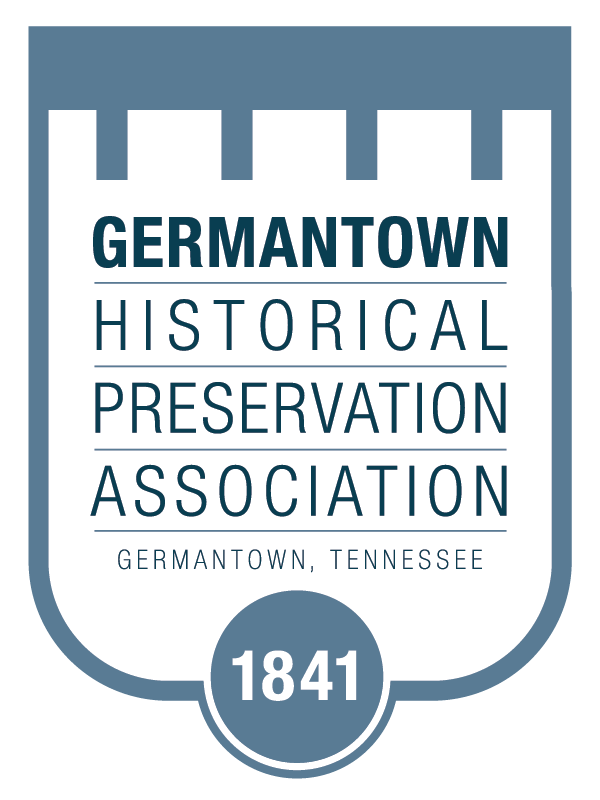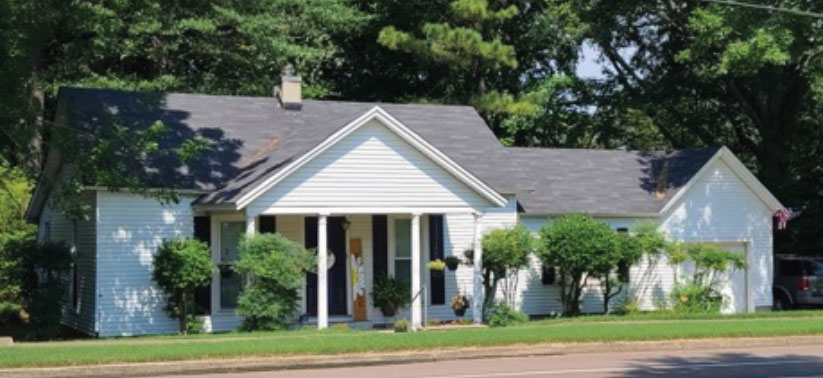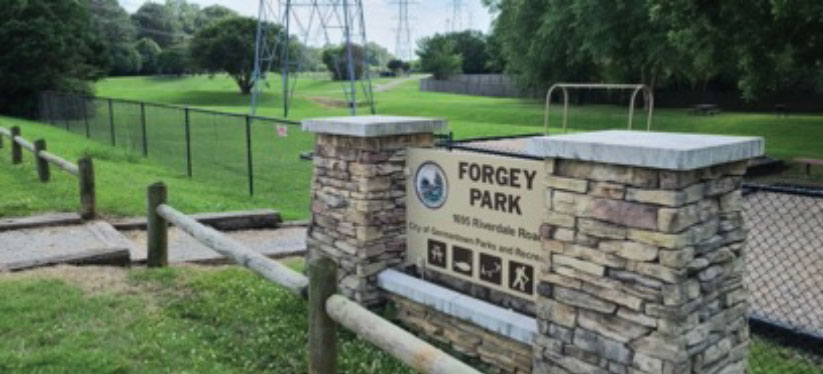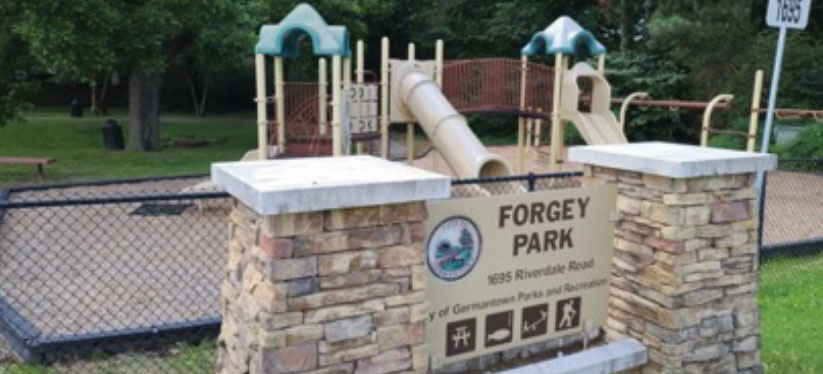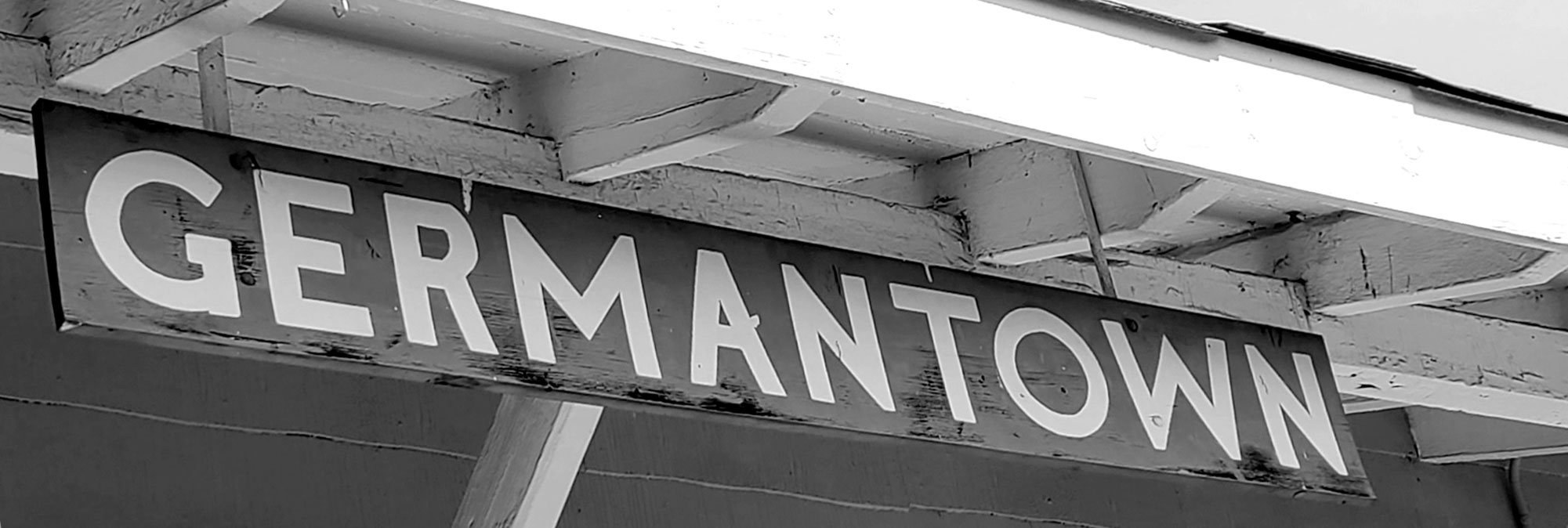
The Forgey Home
by Andrew Pouncey
Information for this story was adapted from articles in The Germantown News written in 1977 and 1990.
Years ago, Riverdale Road was a long lane that wound from Old Poplar Pike northward through the pastures of Frances Wright’s Nashoba Plantation.
G. B. Howard, with his wife and two daughters, moved from Memphis to Germantown and bought a white frame house and an adjacent five acres of land from Pete Callis for $500 in 1914. Mr. Howard, a dairyman never anticipated that he would drive Germantown’s horse-drawn school bus for several years.
“My daddy was a dairyman, Mrs. Forgey said, “and back in ’17 and’18, the winters were very rough and cold. At that time, he drove a school bus, an old wagonette pulled by horses.”
“He went to Mt. Moriah, just a little town, just a stop in the road you might say, out from Germantown. He’d have to get up at 4 o’clock in the morning to get his horse ready and get the children in time for school during that cold, hard winter. The seats ran lengthwise, instead of going crosswise as buses do today. The kids were facing each other. That’s when they’d get into so much trouble. My daddy used to pull the kids’ ears when they’d be bad to make them quiet down on the school bus, but they all loved him.”
Mrs. Forgey laughed as she recalled an incident that happened after her father bought a motorized school bus. “One day the bus got stuck in the middle of a muddy road. All the school children piled out to get behind the bus to push, while Mr. Howard got behind the wheel and started the engine. Try as he might, he could not get the bus out of the road. Little did he realize that the children behind the bus were not trying to push the bus out of the road, but were pulling back on the bumper with all their might trying to keep it in the mud so they would not have to get to school.”
When the Howards moved to Germantown there were only four white families in the neighborhood. Mrs. Forgey said, “all the rest were black.”
Near the Howards lived two black families, Lady and Charlie Tice and Kitty and Mose Hunt. “We kids used to like to run over there because they would give us wine and cake, anything they had. They just humored the very life out of us,” Mrs. Forgey said.
“Back in 1917, I had heavy surgery, and I was in bed nine months. This same Lady Tice – she truck-farmed – would go into town, and she’d always bring me something special home when she’d come. And she would clap her hands and dance for me – just as cute as she could be.”
“I can remember as a child there was a blacksmith’s shop in the middle of town on the corner of North Street and Germantown Road, run by Mr. Charlie O’Neill, Mrs. Pearl Scruggs’s brother.
There was a second blacksmith’s shop as well, and we used to stop and look at the things there. We were walking to school before we had the school bus. Highway 72 (Poplar Avenue) was non-existent. Old Poplar Pike was the road that led from Memphis to Collierville.”
Mr. Howard sold the milk to Forest Hill Dairy and a truck would come to pick it up. In the early days when her father first began operating the dairy, there were no electric coolers for storing the milk. “There was a great big vat, and the milk would run down there.” Mrs. Forgey said. “Somebody would have to stir it all the time to keep it cool. That was the strainer. Then the milk was lowered into another vat with ice in it to keep it cool.”
“There was much hard work involved in running the dairy, but there was always a time reserved for relaxation. I can remember many picnics and get-togethers in our front yard. People were more sociable, simply because visiting friends and relatives was our best form of entertainment. Sunday was the day when hard work and severe weather were forgotten.” Mrs. Forgey’s mother would always prepare a Sunday dinner that could accommodate any visitors that the children and family invited back after church.
“You never ‘invited anyone into your home’ at that time,” Mrs. Forgey said. “If they wanted to spend the day with you, they came. Cooking was altogether different in the early 1900s. Our meat was usually bought from a man who came by with freshly butchered beef in a cart. Without freezers, the meat had to be cooked right away and in quantity. Our vegetables were either fresh from the garden or canned at home so there was always an abundance of good food on hand. In the summer before we would go to church, we always froze a freezer of ice cream. When the fruit came in, we’d make peach or strawberry.”
Younger brother Ingram B. Howard went into the dairy business with his father. Mrs. Forgey kept the dairy after her father died. Her mother lived on the farm until her death in 1945. When health reasons made the maintenance of the land and cattle prohibitive, Mrs. Forgey leased the barn that formerly was the dairy and the remaining 18 acres of pasture to a man who raised Shetland ponies. “I grew up with farm animals and I loved to see them grazing in the fields.”
In 1977, Mrs. Henri Howard Forgey said, “I just can’t sell any more of my land. It breaks my heart to see how fast things can change. I like to look out my back window at my farm and at the open space.”
Until 1988, she resided in this little white house on Riverdale Road. For 74 years, the house sheltered the Howard family, and the surrounding 31 acres of land absorbed the family’s memories through three generations.
But in December of 1988 at 87 years of age, when Mrs. Forgey moved out of her lifelong home, she sold part of her acreage and donated the rest of her land to the city of Germantown. Now the old house has new residents and the land on which Mrs. Forgey use to play as a child is a park and playground for the Germantown youth of today.
Area developer Vann Thomas, who fiscally supported and constructed Forgey Park, said, “she had the most sought-after property in the area in the heart of the prime residential property. Because of the TVA towers put on the Howard property in 1930, turning the area into a residential or business sector was prohibited. So, when Mrs. Forgey donated nine acres to Germantown and moved to Kirby Pines Estates, the city transformed the previous pastureland into a playground and lake area and named it in her honor. This is really a neat little park, named for a wonderful lady.”
Source
Sixty Years On The Farm by Anita Ledsinger, The Germantown News, 1974.
Dairyman’s Daughter Recalls Coal Oil Lamps and Horse Drawn School Buses by Beverly Booth, The Germantown News, June 30, 1977.
Park stands on Pioneer Land; Old House Remains, The Germantown News, Thursday, October 25, 1990.
